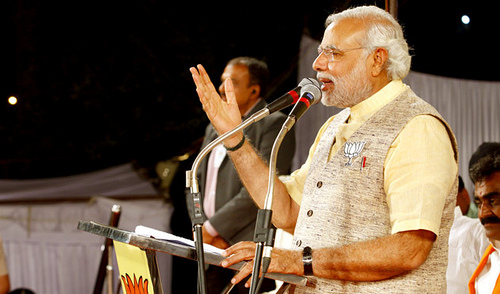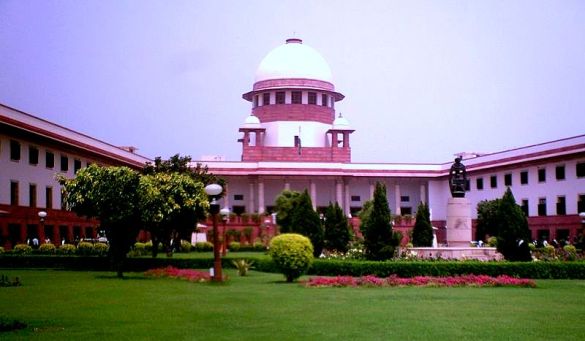
Will Modi do justice to Dalit Muslims and Dalit Christians by acting on the recommendations of Sachar Committee Report concerning Constitution (Scheduled Castes Order), 1950? (Image: Flickr)
While addressing an election rally in Bihar, Prime Minister Narendra Modi took a dig at the grand alliance of Congress, JD(U) and RJD by raking up the issue of religion-based reservations. Modi said, “The leaders of this ‘Mahaswarth’ alliance are trying to mislead the people on the issue of reservation. It is clear through the discussion of our Constitution makers that reservation cannot be given on the basis of religion.” He added that “these leaders are making a devious plan. They are conspiring to take away 5 per cent reservation of Dalits, Maha Dalits, backwards and extremely backwards and give it to a particular community”.
Though Modi did not particularly name any community, it was apparent that he was referring to Muslims. What Modi was attempting to do was consolidation of Hindu votes by tacitly asking them to rise above caste and vote in unison to outdo “Muslims” who were portrayed as a group which was out to swallow the “Hindu” pie of reservation benefits. Such remarks are a reflection of the BJP’s nervousness in Bihar where they might suffer a setback due to the polarising remarks of their ministers and legislators both at the central and state level following the Dadri lynching episode which occurred last month.
Interestingly, Prime Minister Modi added, “I come from an extremely backward class and understand the pain of having been born to a poor woman. I will not allow this to happen. I pledge to protect the rights of Dalits, Maha Dalits and backwards.” If Modi truly believes in what he says then he should immediately initiate steps to outlaw religion-based reservations which have been in existence in our country since 1950.
Yes, you heard it right. The Constitution (Scheduled Castes) Order, 1950 pertaining to Article 341 has been providing religion-based reservations for more than 60 years now. The controversial 1950 order whose legality has been repeatedly questioned states, “No person who professes a religion different from the Hindu, the Sikh or the Buddhist religion shall be deemed to be a member of a Scheduled Caste.”
Initially, the order only recognised Scheduled Castes from the Hindu religion. Thereafter, it was amended twice in 1956 and 1990 to include Sikhs and Buddhists, respectively. The question to be asked is: Can’t a Muslim, Christian, Jain or Parsi be a Scheduled Caste? Do Hindus, Sikhs and Buddhists have a monopoly over being Scheduled Castes?
The Sachar Committee Report, whose findings suggested that the Muslims of Gujarat are among the most prosperous in the country (and was effectively utilised by BJP spokespersons to build on Mr Modi’s vikaas purush image), had the following to say about Constitution (Scheduled Castes) Order, 1950: “Dalit (SC) Muslims are not allowed the benefits of Scheduled Caste quota, while their counterparts in Sikh community (Mazhabi Sikhs) and Buddhist community (Neo Buddhist) are allowed the benefits of reservation quota for SC.”
It further added, “It is recommended that Para 3 of the Constitution (Scheduled Castes Order), 1950 – which originally restricted the Scheduled Caste net to the Hindus and later opened it to the Sikhs and Buddhists, thus still excluding from its purview the Muslims, Christians, Jains and Parsis, etc – should be wholly deleted by appropriate action so as to completely delink the Scheduled Caste status from religion and make the Scheduled Caste net religiously-neutral like that of the Scheduled Tribes.”
Will Modi do justice to Dalit Muslims and Dalit Christians by acting on the recommendations of Sachar Committee Report concerning Constitution (Scheduled Castes Order), 1950? He won’t because the talk of protecting the rights of Dalits and Mahadalits is hollow rhetoric and electorally motivated. Moreover, Modi’s party is ideologically opposed to granting of SC quota benefits to Dalit Muslims and Dalit Christians.
In a speech delivered on August 14, 2004 in Mumbai, BJP patriarch LK Advani said, “For a long time, there have been demands for extending reservations to so-called ‘Dalit’ Christians and ‘Dalit’ Muslims. However, successive governments have not paid heed to these demands. Why? This is because the framers of the Indian Constitution were very clear in their minds that caste is a feature of the Hindu society. If some lower caste Hindus converted to Islam or Christianity in the past, it was because of the claim and the promise of these religions that they were casteless and hence offered an equal station to the converts vis-a-vis original Muslims or Christians.”
There can’t be a more preposterous assertion. Sikhism and Buddhism are also casteless religions in the sense that they do not advocate the division of society on caste lines. Yet Dalit converts to Buddhism and Sikhism are provided with reservation under SC quota. Then why the same privilege can’t be extended to Dalits who converted to other religions including Islam and Christianity? Caste, unfortunately is no longer a problem of the Hindu society as LK Advani opines. It is a problem of the Indian society. Though caste doesn’t exist in Islam or Christianity per se but caste system exists among Muslims and Christians living in India. Therefore, it is wrong to state that Dalits can’t be Muslims or Christians.
The communal Constitution order of 1950 won’t go away anytime soon because no one has the courage to do what justice demands. The Indian National Congress was the party responsible for enacting this provision. It was in power during the last ten years from 2004-2014. Despite repeated pleas from civil society it never bothered to amend the 1950 order. Instead it introduced a minority sub quota of 4.5 per cent in the lead up to the 2012 Uttar Pradesh Assembly Elections. It was touted as “Muslim quota” and floated by the then minority affairs minister Salman Khurshid.
Though it was for all minorities yet the tag “Muslim” became synonymous with it simply because the Congress was desperate to encash on the votes of Muslims in the Uttar Pradesh elections. Competitive politics demanded that Mulayam Singh Yadav’s Samajwadi Party dismissed 4.5 per cent quota for minorities as too less and promised even more. In its blind pursuit of the Muslim vote, the Congress forgot to follow the correct procedure leading the Andhra Pradesh High Court to strike down the 4.5 per cent sub quota for religious minorities in May 2012.
The court said, “No evidence has been shown to us by the learned assistant solicitor general to justify the classification of these religious minorities as a homogenous group or as more backward classes deserving some special treatment.” It went on to state, “We must, therefore, hold that Muslims, Christians, Sikhs, Buddhists and Zoroastrians do not form a homogenous group but a heterogeneous group.”
Have you ever wondered why do politicians reignite the debate on reservations only before elections? Congress and SP remembered Muslims before Uttar Pradesh elections, Modi remembered Dalits before Bihar elections and the inimitable Lalu Prasad recently described the upcoming elections as a “fight between backward and forward castes”.
Reservations have become a political tool in the hands of our corrupt leaders. In the midst of political mudslinging, the core issue concerning an objective analysis of the prevailing reservation policy is being overlooked. Should 21st century India adopt a reservation policy? If yes, then what should be the criteria for granting reservation in educational institutes and jobs? How should it be implemented? These are the questions which our leaders should have addressed clearly but they never did so.
Millions of Indians still find themselves trapped in the vicious cycle of poverty. Several others are educationally backward and belong to communities that are actively discriminated against and grossly under-represented in government sector jobs. Therefore, it is incumbent upon the State to help such individuals by means of affirmative action. One cannot shrug off the need for reservation by citing simplistic arguments of merit. The bigger picture needs to be taken into consideration. Hence, it is essential to have reservations in place for disadvantaged sections of society.
The second point is in relation to the basis on which reservation is to be granted. This is a subject on which the Central and state governments must necessarily revisit their policies. BJP’s Subramanian Swamy maintains that reservations should apply to those who have historically been discriminated against (Dalits, Mahadalits and the likes) and not the erstwhile ruling class like Brahmins, Muslims and Christians. This is a flawed proposition.
I’ve studied along with reserved category students who belonged to a historically disadvantaged group but made use of Apple iPhones. Such individuals are not disadvantaged and shouldn’t be reaping the benefits of reservation. We have a lot of people from the so-called forward castes who are struggling financially and need state support.
The only way out is to make the economic status of an individual the foremost criterion while granting reservation. Secondly, a sub quota needs to be drawn out of the entire reservation pool to exclusively cater to those people who are economically backward and also belong to communities that are educationally backward, under-represented in government jobs and services and victims of social discrimination. We need to adopt an evidence-based approach instead of an electoral or agitation-based approach while identifying such communities.
Backwardness would have to be proven on the basis of data and not perception. No community should be declared as being backward by the government because the party in power intends to reap their votes in the coming elections. Neither should governments give in to pressure from groups who organise bandhs and paralyse state machinery including railways to acquire reservation status. This sounds good on paper but the governments are obviously incapable of doing so because of their overt political agenda. We can only hope that good sense prevails and political parties start thinking along these lines else law courts might have to step in.
Lastly, we need to be absolutely mindful of certain rules while implementing the reservation policy. Reservations have to be time bound. They need to be reviewed and reformed from time and time. As per Supreme Court, reservation cannot extend to more than 50 per cent of the total seats. All institutions should abide by the said rules. While implementing reservation policy, additional seats or vacancies need to be created. For instance, if there are 20 seats in an educational institution for a particular course or 20 vacancies in a government office, reservation of 50 per cent should mean 20 general seats + 50 per cent reserved seats, instead of 20 – 50 per cent reserved seats.
Most importantly, it has to be ensured that reservations don’t compromise on quality and are provided only to those who truly deserve it. The maximum relaxation lent to applicants from reserved category shouldn’t go below 10 per cent of the general category cut-off in any case. If it happens then even people from the unreserved category will learn to appreciate the utility of reservations. This is because they will be sharing their classrooms and offices with people from the reserved category who are deserving and have achieved a certain level in the merit list despite the economic and social handicap that they have suffered from. This will eventually lead to the fading away of resentment regarding reservation among the unreserved people which currently exists in gigantic proportions.
http://www.dailyo.in/politics/bihar-polls-narendra-modi-reservation-muslims-christians-parsis-jains-scheduled-castes/story/1/7032.html
(This article was originally published in DailyO.)

